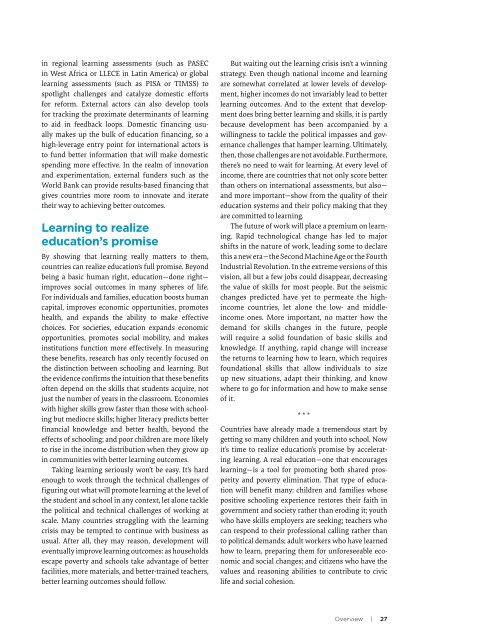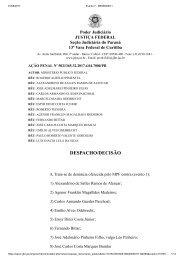Brasil só deve dominar Leitura em 260 anos, aponta estudo do Banco Mundial Relatorio Banco Mundial _Learning
Create successful ePaper yourself
Turn your PDF publications into a flip-book with our unique Google optimized e-Paper software.
in regional learning assessments (such as PASEC<br />
in West Africa or LLECE in Latin America) or global<br />
learning assessments (such as PISA or TIMSS) to<br />
spotlight challenges and catalyze <strong>do</strong>mestic efforts<br />
for reform. External actors can also <strong>deve</strong>lop tools<br />
for tracking the proximate determinants of learning<br />
to aid in feedback loops. Domestic financing usually<br />
makes up the bulk of education financing, so a<br />
high-leverage entry point for international actors is<br />
to fund better information that will make <strong>do</strong>mestic<br />
spending more effective. In the realm of innovation<br />
and experimentation, external funders such as the<br />
World Bank can provide results-based financing that<br />
gives countries more room to innovate and iterate<br />
their way to achieving better outcomes.<br />
<strong>Learning</strong> to realize<br />
education’s promise<br />
By showing that learning really matters to th<strong>em</strong>,<br />
countries can realize education’s full promise. Beyond<br />
being a basic human right, education—<strong>do</strong>ne right—<br />
improves social outcomes in many spheres of life.<br />
For individuals and families, education boosts human<br />
capital, improves economic opportunities, promotes<br />
health, and expands the ability to make effective<br />
choices. For societies, education expands economic<br />
opportunities, promotes social mobility, and makes<br />
institutions function more effectively. In measuring<br />
these benefits, research has only recently focused on<br />
the distinction between schooling and learning. But<br />
the evidence confirms the intuition that these benefits<br />
often depend on the skills that students acquire, not<br />
just the number of years in the classroom. Economies<br />
with higher skills grow faster than those with schooling<br />
but mediocre skills; higher literacy predicts better<br />
financial knowledge and better health, beyond the<br />
effects of schooling; and poor children are more likely<br />
to rise in the income distribution when they grow up<br />
in communities with better learning outcomes.<br />
Taking learning seriously won’t be easy. It’s hard<br />
enough to work through the technical challenges of<br />
figuring out what will promote learning at the level of<br />
the student and school in any context, let alone tackle<br />
the political and technical challenges of working at<br />
scale. Many countries struggling with the learning<br />
crisis may be t<strong>em</strong>pted to continue with business as<br />
usual. After all, they may reason, <strong>deve</strong>lopment will<br />
eventually improve learning outcomes: as households<br />
escape poverty and schools take advantage of better<br />
facilities, more materials, and better-trained teachers,<br />
better learning outcomes should follow.<br />
But waiting out the learning crisis isn’t a winning<br />
strategy. Even though national income and learning<br />
are somewhat correlated at lower levels of <strong>deve</strong>lopment,<br />
higher incomes <strong>do</strong> not invariably lead to better<br />
learning outcomes. And to the extent that <strong>deve</strong>lopment<br />
<strong>do</strong>es bring better learning and skills, it is partly<br />
because <strong>deve</strong>lopment has been accompanied by a<br />
willingness to tackle the political impasses and governance<br />
challenges that hamper learning. Ultimately,<br />
then, those challenges are not avoidable. Furthermore,<br />
there’s no need to wait for learning. At every level of<br />
income, there are countries that not only score better<br />
than others on international assessments, but also—<br />
and more important—show from the quality of their<br />
education syst<strong>em</strong>s and their policy making that they<br />
are committed to learning.<br />
The future of work will place a pr<strong>em</strong>ium on learning.<br />
Rapid technological change has led to major<br />
shifts in the nature of work, leading some to declare<br />
this a new era—the Second Machine Age or the Fourth<br />
Industrial Revolution. In the extr<strong>em</strong>e versions of this<br />
vision, all but a few jobs could disappear, decreasing<br />
the value of skills for most people. But the seismic<br />
changes predicted have yet to permeate the highincome<br />
countries, let alone the low- and middleincome<br />
ones. More important, no matter how the<br />
d<strong>em</strong>and for skills changes in the future, people<br />
will require a solid foundation of basic skills and<br />
knowledge. If anything, rapid change will increase<br />
the returns to learning how to learn, which requires<br />
foundational skills that allow individuals to size<br />
up new situations, adapt their thinking, and know<br />
where to go for information and how to make sense<br />
of it.<br />
* * *<br />
Countries have already made a tr<strong>em</strong>en<strong>do</strong>us start by<br />
getting so many children and youth into school. Now<br />
it’s time to realize education’s promise by accelerating<br />
learning. A real education—one that encourages<br />
learning—is a tool for promoting both shared prosperity<br />
and poverty elimination. That type of education<br />
will benefit many: children and families whose<br />
positive schooling experience restores their faith in<br />
government and society rather than eroding it; youth<br />
who have skills <strong>em</strong>ployers are seeking; teachers who<br />
can respond to their professional calling rather than<br />
to political d<strong>em</strong>ands; adult workers who have learned<br />
how to learn, preparing th<strong>em</strong> for unforeseeable economic<br />
and social changes; and citizens who have the<br />
values and reasoning abilities to contribute to civic<br />
life and social cohesion.<br />
Overview | 27








